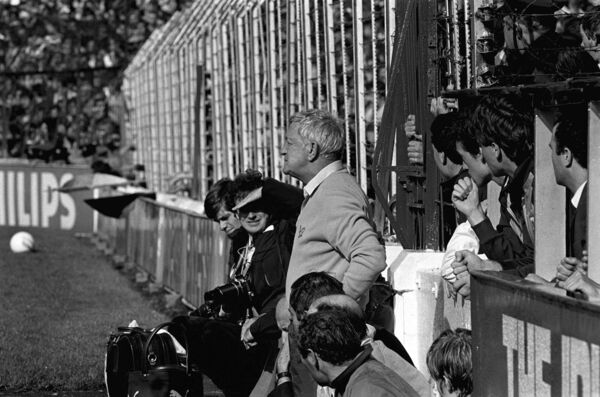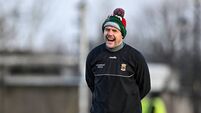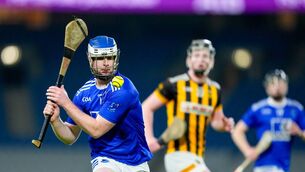Another one bites the dust, so where to now?

Happier times: The now former Mayo manager Kevin McStay with the then Derry manager Mickey Harte at last year's All-Ireland SFC preliminary quarter-final between the counties at Hastings MacHale Park, Castlebar. Picture: INPHO/James Crombie
When I was a kid it was simple. We didn’t know who our or any county’s GAA manager was because counties, ostensibly, didn’t have any. It was an alien concept. Down, Kerry, Galway and Dublin all won All-Irelands in the 1960s without the cult of a supremo. So who guided them? Surely not an unwieldy selection committee – or maybe it was? Did one voice fill the room and stifle the babble and chaos that committees bring? Simpler times, deeper times too.
The arrival of Kevin Heffernan in 1974 heralded a sea change in the GAA world. His smashing of the culchie-imposed glass ceiling on the Dubs saw a blue wave crash across the game. The Ban was gone a bare three years, the full-back in some counties still took the kickouts and you could buy papier-mâché hats that bled down your face if it rained at the match. Heffo’s Army was met head on by Mick O’Dwyer’s Kerry, or Kerry’s Mick O’Dwyer, and within a single season the cult of the bainisteoir was born. Today most county setups would match Todd Boehly’s Chelsea backroom roster.
Mayo, as is our want, seem to time their re-entry into mainstream media with uncanny nous, and managed to elbow aside the upcoming football quarter-finals last weekend. A statement, cold as a week-old salad, brought down the shutters on our latest managerial ensemble. I picked the word ‘ensemble’ deliberately because what started out as Kevin McStay’s ‘Mayo’ wound up a potpourri of different styles. Thank you Kevin, your decency through your tenure always shone through. Like the lover said to the ex, ‘it wasn’t you, it’s me’.
So Mayo now sit down to pick a new manager. Perhaps by the time this hits the printer they’ll have a new regime in place such was the speed they guillotined the last iteration of their management team. A few thoughts spin in my aging head. What leads to success – a strong executive with proven leaders or a strong manager with a track record? What does a board look for in a manager? What does a manager look for from a board? Does a board have a general application for job vacant scenario and get a team of consultants to trawl through the CVs – or do they pick a name and target that man themselves?
The one thing that can be stated conclusively is that most counties end most seasons in failure. It’s how that ‘failure’ is lipsticked up or spun that determines another go in the merry-go-round. If we accept that it’s one of either Dublin or Kerry that will win Sam with the intrusion occasionally of a Tyrone, Donegal or Armagh, then are most counties tilting at windmills? On the other hand, if you are like us (and no other county is), contesting eleven All-Ireland finals plus two replays since 1989, then we, you, I, live in a twilight zone of close but no cigar. And that’s a killer.
How does a county board pick a manager? What questions do they ask? How does a manager sell his vision, articulate it? Let’s pick a few at random.
You are Kevin Heffernan at the start of the 1973/74 season. Your first championship match will be the undercard before the replayed National Football League final between Kerry and Roscommon in May ’74. A handful of followers will turn out. A recently retired tubby full-forward will be sitting in the stands watching his ex-colleagues labour to beat a hurling county, Wexford, and stumble into the next round. Come September the tubby full-forward has been integrated into the team, who coincidentally happen to win an All-Ireland. Was it the board, Heffo or the returning Jimmy Keaveny that won that year’s All Ireland?
Did the monosyllabic Eugene McGee tell Offaly County Board that the 1982 All-Ireland winning score would come from a player he had axed from the panel a season earlier, a player only recalled in the last four weeks leading up to that famous final of ’82, when Offaly and Seamus Darby laid waste to the Kingdom’s dreams of a first five-in-a-row? Was that articulated, transmitted or was it fate? What was it that McGee saw in August 1982 that brought Darby back into the fold? After all, he already had a stellar forward line led by the imperious Matt Connor… what was it that drove him to seek out a slightly tubby Seamus Darby?

What was it that compelled Micky Harte to recall and parachute Stephen O’Neill into Tyrone’s starting fifteen for the 2008 All-Ireland final against Kerry? O’Neill had retired due to injury but cycling had helped alleviate that injury. The weeks leading up to that final provoked something deep in Harte’s mind. O’Neill might play a part in his plans. The risk was high – non playing all year, upsetting a starting fifteen, upsetting a thirty man established panel, someone was going from number 30 to 31 – and both Harte and O’Neill had decisions to make. Crucially, so too did Kerry, their opponents. Their plans of meeting an O’Neill-less Tyrone were now thrown into doubt. Would they start him, would they not? Why would they? Who would mark him – and why? All Kerry uncertainty. Stephen O’Neill played, average enough but crucially he tied up Kerry launchpad Tomás Ó Sé, who was caught between a man-marking job on an average O’Neill but the memory of what a flying O’Neill might do. Kerry and Ó Sé fell between two stools.
Or maybe it’s the county board supremo that has the vision, albeit exercised in a different way. Reading James Laffey’s Will Galway Beat Mayo, the name ‘Tull’ Dunne, to me at least, was a key component on Galway’s four All-Irelands between 1956 and 1966. In fact, his fingerprints are all over that era. Simple things perhaps. At a routine Connacht Council meeting where transfers are ratified, a young man whose family’s farm straddles the Galway-Mayo border is called up for trials with the Mayo minors. Just the dotting to be done. Tull asks if the lad is a brother of another young man recently gone to Maynooth to study for the priesthood – also a good footballer. In that case, said Dunne, the lad would remain on the Galway side of the farm. The boy? Noel Tierney.
Mayo get giddy and cavalier in 1965 and overlook Claremorris native Jimmy Duggan for minor trials. That September, Tull and the Galway chairman call a young man out from the St Jarlath’s study hall. They remind him of his Galway roots and all of that. A year later Mayo minors won a great All-Ireland final against Down and the young lad called from the study hall wins a medal too. It’s a senior All-Ireland though, and it’s with Galway. The boy’s name was Jimmy Duggan from Claremorris.
In 1960, the Galway minor goalkeeper was injured and thus missed the All-Ireland semi-final. Cue panic. Dunne recalled a young lad from the Gaeltacht who performed well in goals. No panic. Bring him in, play him and when the other lad recovers for the final, bring him back. The returning keeper? Johnny Geraghty. Tull Dunne’s intimate knowledge of the Galway DNA saved the day again.
Was it the manager of Galway between 1956 and 1966 that worked the oracle, was it the board, was it Tull or was it simply their time? Perhaps a combination of them all.
Today we look back at Mick O’Dwyer’s great runs, those of Sean Boylan and Kevin Heffernan too. Yet all three had to have the staunch defence of their county chairs at various times to keep them in their jobs when the clubs wanted them out. How much credit does Kerry’s Ger McKenna, Meath’s Fintan Ginnity and Jimmy Grey get? How big a part did John Costello play in Dublin’s 2011-23 run? Hard to know but the connections are strong in all cases.
So we go forth and seek a new saviour. Various names will be thrown into the mix, perhaps a chosen one is already known. We will be informed. Will it bring us closer to what we want and crave? I don’t know. What I do know is that the journey will only start with all the composite pieces in place. It’s my opinion that we are not anywhere near that place. So the vacuum will now be filled with who gets the job, who they have as support and who we play in the league. And then we hold our breath and go again.
Something is clearly out of step between what separates Mayo from being an elite All-Ireland winning GAA county. The man who solves it should also pick this week’s winning lotto numbers. The examples I gave above merely show the chaotic and random bits and pieces that make a manager and a county successful. If it’s for you, it won’t pass you. If impediments exist then they will always underachieve, regardless if Pep, Slot or Klopp is the boss. Good luck to the next crew.




